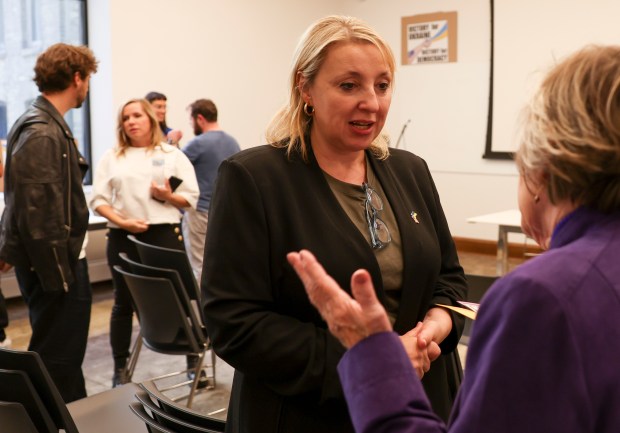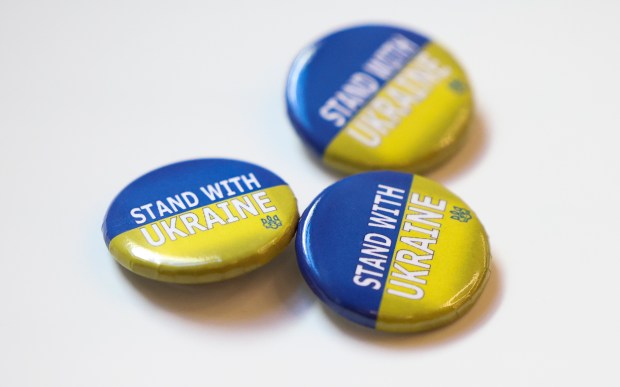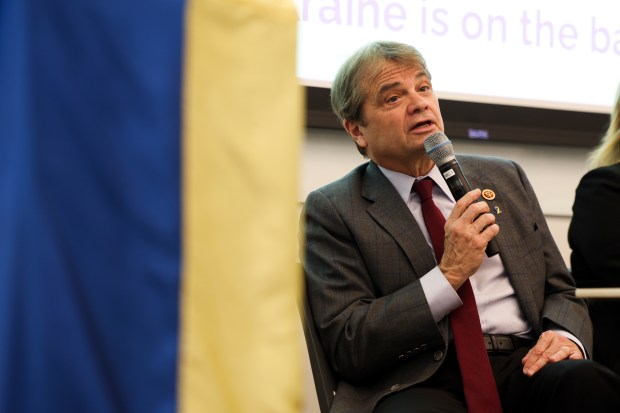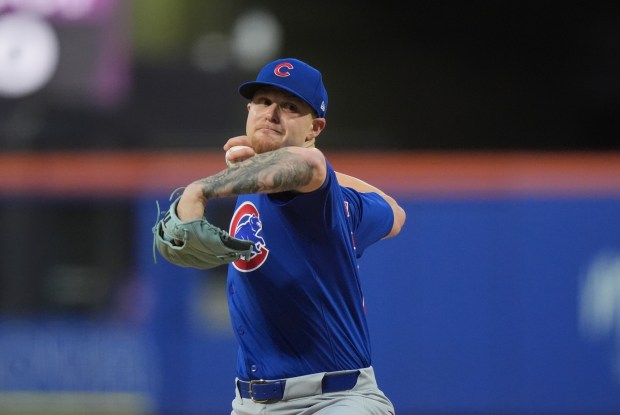With little more than a week to go in a tight presidential race, Ukrainian Americans are grappling with the uneasy prospect of a new commander-in-chief for their homeland’s strongest ally as the nearly 3-year-old war with Russia drags on.
“There’s a lot of frustration, anxiety, maybe even fear and a lot of uncertainty, what to expect in either case,” said Dr. Mariya Dmytriv-Kapeniak, a Chicago-based physician who is president of the Illinois branch of the Ukrainian Congress Committee of America.
Many Ukrainian Americans say they fear the possibility of another term for former President Donald Trump, who critics argue is too cozy with Russian President Vladimir Putin and too willing to end the war at great cost to Ukraine.
But in a community in which many were historically drawn to longtime anticommunist values of the Republican Party, full-throated support for the Democratic ticket led by Vice President Kamala Harris is far from universal.
Outside Sts. Volodymyr & Olha Ukrainian Catholic Church in Chicago’s Ukrainian Village on a recent morning, Irena Sonevytsky, 67, who immigrated to the United States in 1992, said she previously supported Trump because she wanted a strong leader for the U.S. Now, she’s leaning toward Harris, though she doesn’t feel she knows enough about the vice president.
Overall, she said she just wishes more people would see the war as she does: “Really a fight between good and bad.”
In a campaign dominated by the economy and immigration, the war in Ukraine has taken a back seat in the national conversation. “At the moment, neither candidate is offering concrete answers, how to help Ukraine to win and defeat Putin,” Dmytriv-Kapeniak said.
Trump’s rhetoric in particular shows that “Ukraine is not in any way on their priority list,” likely turning off some voters who care about the country from voting Republican this year, she said.
Trump in the September debate with Harris was asked if he wanted Ukraine to win the war and replied, “I want the war to stop,” saying that it was in the best interest of the U.S. “to get this war finished and just get it done, negotiate a deal.”
Standing alongside Ukrainian President Volodymyr Zelenskyy in New York last month, Trump was similarly noncommittal, saying he was confident that if he’s elected “we can work out something that’s good for both sides.”
Ukrainians are mobilizing to drive turnout in swing states, particularly in areas with significant populations with ties to the Eastern European nation, said Pavlo Bandriwsky, a vice president of the Ukrainian Congress Committee of America’s Illinois Division.
“There’s no question that Ukrainians, Ukrainian Americans have an opportunity to be decisive in this race in at least three states,” he said, citing the key states of Wisconsin, Michigan and Pennsylvania.
Illinois, while not a swing state, is home to hundreds of thousands of people of Ukrainian descent, including Democratic Gov. JB Pritzker, who says Trump opened the door to Russia’s 2022 invasion “because essentially, he never stood up for Ukraine.”
“I don’t know how it’s going to affect the ultimate vote on Nov. 5,” Pritzker said recently when asked about the war. “I do know that I think from my perspective, patriots of the United States who think that Russia and Vladimir Putin are working against U.S. interests should be standing with the administration and supporting the government of Ukraine.”
Many Ukrainian Americans remain unsure another Democratic presidential term would be the answer for ending the war with an outcome that’s favorable to Ukraine. In that way, the community reflects one of the issues plaguing Harris: a hesitation to support the Democratic ticket because of Biden-era policies.
Between the start of the war and this week, the U.S. has provided $64.1 billion in military assistance to Ukraine, according to the U.S. State Department. But many Ukrainian Americans in Chicago and Milwaukee expressed disappointment in President Joe Biden’s administration’s decision not to lift restrictions on Ukraine using its long-range missiles to strike farther into Russia, citing concerns that doing so could escalate the conflict.
Harris has indicated she supports Ukraine and would pursue broadly similar policy objectives toward the war as Biden, according to a brief from the Council on Foreign Relations. During her own meeting with Zelenskyy, Harris said supporting Ukraine is in the United States’ “strategic interest” and criticized the idea that they should give up any territory in the interest of peace, The Associated Press reported.
Years before the war began, Ukraine was thrust into the national spotlight during then-President Trump’s first impeachment trial, when he was accused of essentially extorting Zelenskyy, said Markian Dobczansky, a historian of the Soviet Union with a focus on Ukraine at the University of Illinois at Urbana-Champaign. Trump was acquitted.
Those events and the war elevated Ukraine from an “obscure, far away” part of the Soviet Union to the top of Americans’ minds, Dobczansky said. They also caused a lot of political discomfort and rethinking about Trump as a leader, he said.
Marta Farion of the Ukrainian Village neighborhood joined about a dozen other Ukrainian American leaders, mostly from the East Coast, to create the group Ukrainian Americans for Harris-Walz, which organized and raised funds to get their message out in mostly Ukrainian-language publications nationwide.
“There is such a stark difference between the two candidates and their positions,” Farion said. “If Trump wins, we are concerned about the fate of Ukraine.”
Earlier this month, the Ukrainian Congress Committee of America, along with other pro-Ukrainian groups, led a “voter education” forum at the Milwaukee Public Library, asking those who filled a meeting space to use their voices to back Ukraine at the ballot box and in lobbying Congress.
While the event was nonpartisan, a featured speaker was Democratic U.S. Rep. Mike Quigley of Chicago, an outspoken proponent of funding Ukraine’s defense and co-chair of the Ukrainian Caucus in Congress. Last year, Quigley was the lone House Democrat to vote against a stopgap funding bill, citing a lack of money for Ukraine.
“The only thing you can’t do is sit on your hands. Every cell in your body ought to be encouraged, moved toward doing something active. This is the most important election of our lifetime,” Quigley said in Milwaukee.
“I won’t name parties. I won’t name candidates, but you all understand what’s at stake,” he said. “Most foreign policy issues have political solutions. I’ll let you decide what our fate is, the fate of our greatest allies.”
Dmytriv-Kapeniak asked the crowd to encourage those who might care about Ukraine but not be as politically active to vote in the country’s interest.

“Your voice is the most important — it’s like your weapon,” Dmytriv-Kapeniak said. Choosing not to vote is to “surrender your weapon,” she said.
But not everyone in the crowd agreed on how to use that weapon.
Alik Kasman, an activist for Ukrainian military aid from Buffalo Grove, said after the event that he thinks both candidates are bad for Ukraine.
Trump is ready to end the war, Biden is doing a “very similar dance,” and Harris may mean a continuation of policies that haven’t done enough for Ukraine, Kasman said.
“One of the problems I see is — we consider this someone else’s problem, so Ukraine is dealing with its own problem and we here are like, the charitable hand. And if times are tough, we can cut that aid,” Kasman said. While that philosophy is understandable, he said, “what that point of view is missing is the fact that stopping aid to Ukraine does not come with zero cost.”

Pritzker, a surrogate for Harris’ campaign, said the choice to support Harris is clear for those who care about Ukraine’s future.
“Anybody who thinks that buddying up with a dictator, an autocrat who is an enemy to the United States, is a good thing, is wrong,” Pritzker said at a Chicago news conference. “So when there’s an invasion by one country into another country, particularly into a country that’s an ally of ours by an enemy, our support for our ally is vitally important. President Biden has done that every step of the way.”
At Sts. Volodymyr and Olha, some agreed that the Democratic ticket was the obvious better alternative, despite any reservations about how the war has been handled so far.
Motria Melnyk, a 72-year-old Northbrook resident who grew up in the Ukrainian Village neighborhood and leads the Ukrainian Institute of Modern Art, said she is backing Harris but wants to see a stronger response to the war from the U.S.
“I’m hoping that our new president will do more for our country, for Ukraine, than has been done until now, and really support it, because Ukraine is a bridge to other countries,” Melnyk said.




